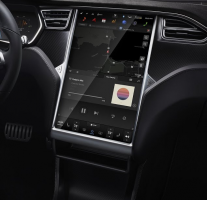— A Tesla touchscreen lawsuit alleges the media control units (MCUs) go black, freeze, crash and fail after only a few years of use in 2014-2016 Model S and 2015-2016 Model X vehicles.
The touchscreen failures allegedly cause serious safety hazards because essential functions are lost when the touchscreens go black or freeze.
According to the class action lawsuit, the touchscreens are the gateways between users and the safety, navigation, entertainment and communication features. But when an MCU fails several functions are lost, including these features:
"[E]xterior lights; acceleration settings; steering modes; regenerative braking; stopping mode; the entire sound system, including the turn-signal tones; displaying warning notifications; critical gauges; GPS navigation; self-driving mode; rear view camera; ability to charge; suspension; heating and air conditioning; and the sunroof."
The Tesla owner who sued alleges the automaker knows about touchscreen problems based on warranty claims, customer complaints and through service centers owned by Tesla.
California plaintiff Entewan Faragalla says he purchased a 2015 Tesla Model S via Tesla’s website, with delivery to take place on or about May 11, 2015. But on multiple occasions, including while driving, the touchscreen allegedly went blank and caused numerous features to fail.
Tesla allegedly told the plaintiff to conduct a soft and hard reset which restarted the MCU, other than the last time which required a complete replacement of the touchscreen.
The plaintiff says he had to pay $2,290.50 for the diagnosis, repair and replacement of the touchscreen because Tesla said the MCU wasn't covered by the warranty.
According to the class action, the solution offered by Tesla forced the customer to pay his own money for a replacement touchscreen that is just as defective as the original MCU.
During his time in the Tesla service center, several Tesla employees allegedly admitted the touchscreens suffer from defects because technicians see the problems on a regular basis. In addition, the employees allegedly told the plaintiff the vehicles should have been recalled because of the MCUs.
Faragalla says he "would not have purchased the Tesla, or would not have paid the purchase price that he did, had he known that he would not be able to safely drive the Vehicle without risk of the MCU going blank, malfunctioning, and disabling numerous features of the Vehicle, including safety features."
The lawsuit alleges Tesla has made statements which show the automaker knows everything that is going on with their vehicles.
"Since we own all of our service centers, we are aware of every incident that happens with our customer cars and we are aware of every part that gets replaced. Whenever there is even a potential issue with one of those parts, we investigate fully.”
Although the Tesla owner's manual allegedly includes more than 40 pages concerning the features and workings of the touchscreens, the plaintiff says Tesla fails to warn drivers the touchscreens can suddenly go black.
The plaintiff says the closest Tesla gets to a warning is telling a driver to park the vehicle and restart the MCU if it acts up.
"However, oftentimes, drivers are not in a position to shift their Vehicles into 'Park' when the MCU malfunctions (for example, if they are driving on a highway), and even when drivers do attempt to restart their touchscreens or power cycle their Vehicles after the Defect manifests, restarting does not resolve the issue. Tesla offers no other instruction on how a user might attempt to troubleshoot or correct the issue." - Tesla touchscreen lawsuit
The touchscreen lawsuit alleges violations of the California Consumers Legal Remedies Act, the Unfair Competition Law, California Business and Professions Code, breach of express warranty under California law, breach of the implied warranty of merchantability under California law as well as violations of the Magnuson-Moss Warranty Act.
The Tesla touchscreen class action lawsuit was filed in the U.S. District Court for the Central District of California: Faragalla, et al., v. Tesla Inc.
The plaintiff is represented by Shepherd Finkelman Miller & Shah, LLP, and Edgar Law Firm LLC.

